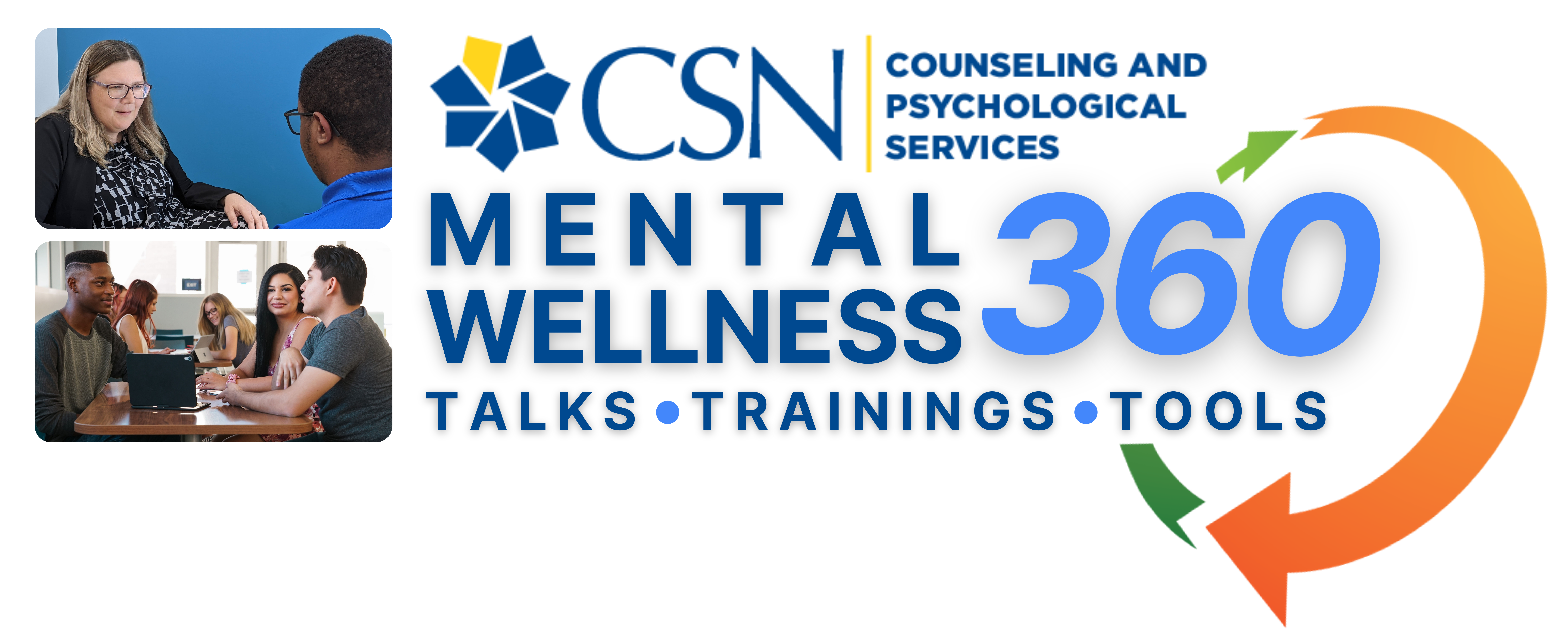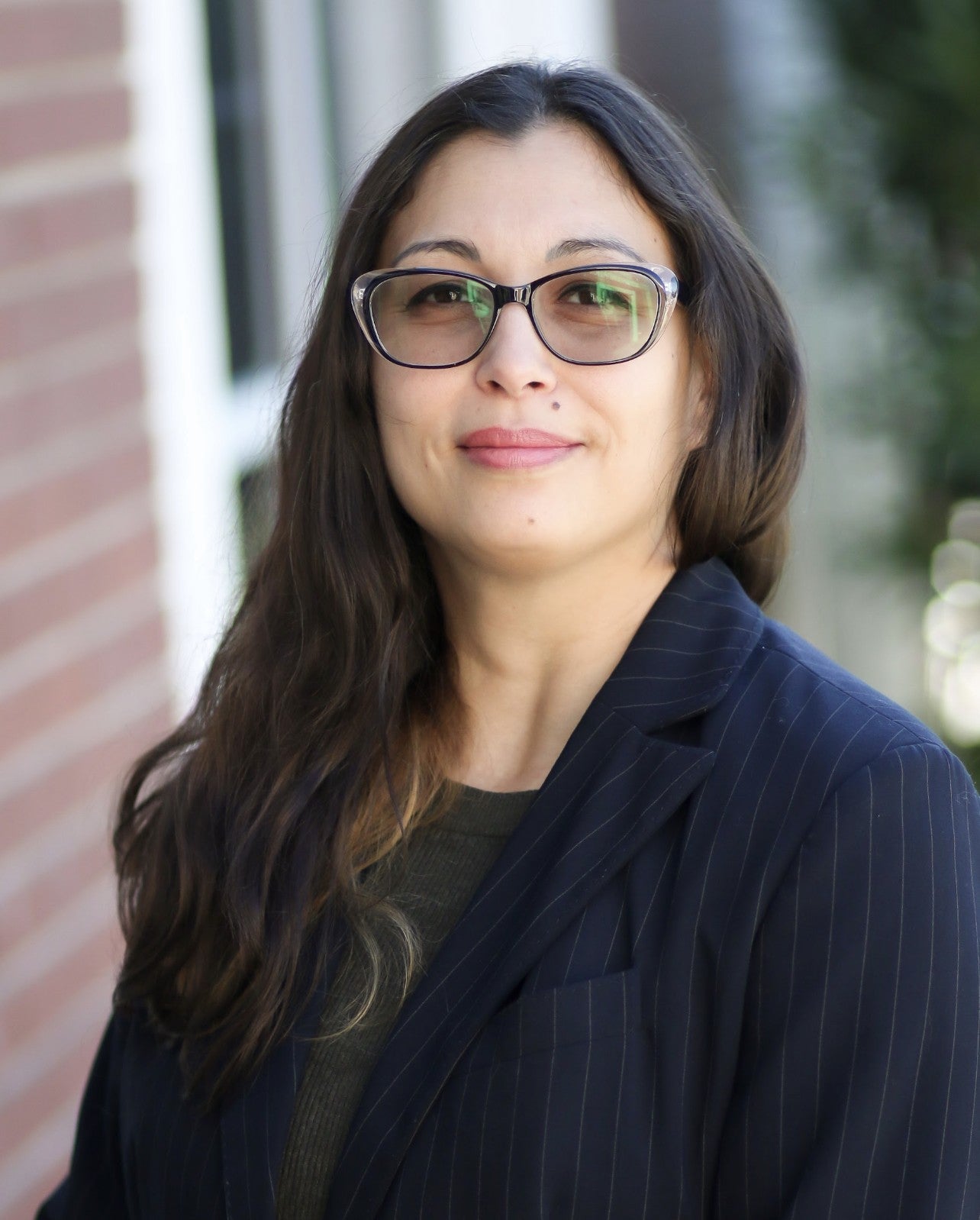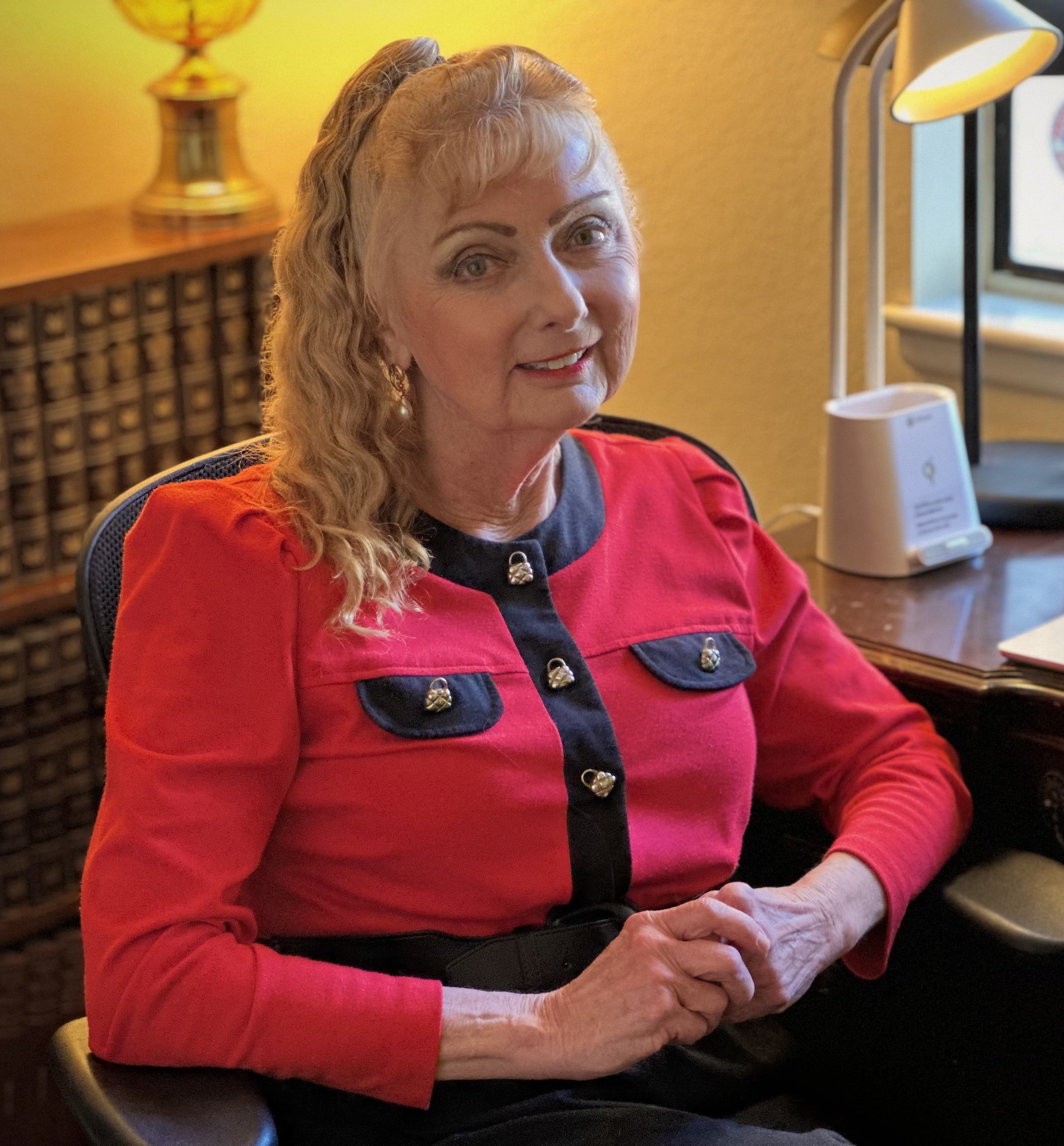Anxiety? Stress? Depression? Burnout? Self-esteem concerns?
Perhaps you've been there. Perhaps you are there.
Brighter days are ahead.
We can help.
Counseling and Psychological Services (CAPS) is committed to supporting your mental wellness as a current CSN student. Mental wellness is the internal capacity to reduce life stressors and demonstrate emotional resilience. When you’re better prepared to think, feel and act, the result allows you to reach and maintain your full potential.
CAPS can help you realize your potential.
The Mental Wellness 360 campaign is a comprehensive series of TALKS, TRAININGS and TOOLS that assists you from all sides. Our services are flexible, responsive, often individualized, and always confidential. Mental wellness is as much about prevention as it is intervention when it comes to navigating life’s mental health challenges.
Whether you’re in need of treatment options or would like to become a better mental health advocate and ally for others, we can help.
CAPS provides personalized support to help CSN students maintain mental wellness through both one-on-one and group counseling opportunities.
Currently enrolled students have access to limited-session, solution-focused counseling at no cost. Schedule a confidential appointment with a licensed clinical therapist by contacting CAPS via phone or email at CAPS@csn.edu. Be sure to have your NSHE ID ready and be prepared to complete the required intake paperwork. Sessions are flexible and offered online (telehealth), in person, or in a hybrid format to fit your needs.
Students can also join ongoing, unlimited group therapy sessions designed to support mental health in a variety of areas, including mindfulness and relaxation techniques, building self-confidence, managing anxiety, and handling stress effectively. These groups provide a welcoming space to connect with peers while developing skills that promote well-being. CAPS Intake Paperwork is also required for group counseling.
Charleston Campus: Building D, Room 104; 702-651-5518
Henderson Campus: Building C, Room 113; 702-651-3099
North Las Vegas Campus: Main Building, Room 120E; 702-651-4099
Meet Our CAPS Clinicians
Crystal Moon, PsyD, LMHC, LCPC
Dr. Moon specializes in neurodivergent care and has extensive experience working with individuals on the autism spectrum, those with ADHD, and others with various neurological differences. She has three degrees in Psychology, including an Undergraduate degree, a Master’s degree in Clinical Psychology, and a Doctorate degree (PsyD). Dr. Moon has been licensed and practicing in the field of behavioral and mental health for nearly a decade. Dr. Crystal Moon is available for in-person therapy at the Charleston Campus and virtually for all CSN students.
“In this position at CSN, my goals are to immerse myself in diversity and to offer my skills to better the mental and behavioral health of the staff, faculty, and student body.” - Crystal Moon, PsyD, LMHC, LCPC
December James, LCPC
December has worked with young adults and their families in mental health in-patient settings, with military families, foster youth, and foster families, as well as private practice in the North Las Vegas area. In 2018, December received the Heart of Education award, and in 2021 she received Recognition as an Effective Therapist in Las Vegas. She has 13 years of experience working as a therapist. December is available for in-person therapy at the N. Las Vegas Campus and virtually for all CSN students.
“Everyone should…know that I am December born in March.” - December James, LCPC
Rosalie Montoya, MSW, LCSW, ACSW
Rosalie specializes in post-traumatic stress disorder (PTSD), trauma, neurodivergence, self-esteem, adults, and young adults. She has been a clinician with CSN’s Counseling & Psychological Services since fall 2016. Rosalie has over 40 years of experience in the Behavioral Health Field and is a recipient of the National Association of Social Workers (NASW) – Nevada Chapter, Social Worker of the Year Award. Rosalie is available for in-person therapy at the Henderson Campus and virtually for all CSN students.
“I especially like working with young adults and older students returning to college. I have experience working with neurodiverse students and students of various cultures and religions.” - Rosalie Montoya, MSW, LCSW, ACSW
Periodic mental health workshops are also offered to help manage emotional, relational and behavioral growth. Upcoming workshops will focus on self-esteem, self-care and suicide prevention.
CAPS coordinates training opportunities for mental health advocates and allies.
Mental Health First Aiders are taught how to intervene and provide resources to peers who exhibit signs of mental distress or substance use. Certification is obtained after completing the 8-hour in-person course. All inquiries can be sent to MentalHealth.FirstAid@csn.edu.
LivingWorks Start teaches participants to recognize when someone may be thinking about suicide and how to connect them to help and support with a 1-hour online training.
For access instructions, please follow these steps:
- Create your LivingWorks account using your email address here.
- Go to the "Our Training" section, browse the learning catalog, and add the LivingWorks START course to your cart. Proceed to checkout.
- You will be asked to provide an address during checkout—feel free to use CSN’s
address.
- You will be asked to provide an address during checkout—feel free to use CSN’s
- Apply the coupon code “CSNCAPS” at checkout for a 100% discount.
- Once you've completed the checkout, launch the course by clicking the "LivingWorks START" hyperlink in your order confirmation or navigate to the "Me" menu.
CAPS sponsors three resources to increase mental health awareness and intervention support.
The Mental Health 360 Resource Guide (Recursos de salud mental disponibles en Español) explores common mental health scenarios and lists Las Vegas Valley treatment providers.
Togetherall is a safe and anonymous online community where you can share lived experiences with others like you. Students don’t use their real names, which encourages the expression of feelings more openly. This free app is moderated 24/7 by trained professionals. Get support, take control and feel better—all in a way that’s most comfortable to you.
Togetherall Explanation Video
Togetherall Testimonial Video
If you're looking for a therapist in the community, check out the Find a Therapist feature on Psychology Today. Please note: We do not monitor this site and cannot guarantee the availability, insurance coverage, or qualifications of community providers.
- 911: Call and indicate there is a mental health emergency.
- Disaster Distress Helpline: Call 800-985-5990 (Press “2” for Spanish).
- Nevada Connect to Services: Call 211 or 866-535-5654.
- Nevada Teen Peer Support Text Line: Text 702-296-8336 (operates 10 a.m.–midnight for individuals 24 years old and younger).
- Signs of Hope Rape Crisis: Call 702-366-1640.
- Suicide and Crisis Lifeline: Call or text 988.
- Trevor Lifeline (LGBTQ+): Call 866-488-7386.
- Veterans Information and Referral: Call 888-777-4443 (PTSD crisis intervention).
How do I schedule an appointment?
Limited-session, solution-focused counseling is available to you as a currently enrolled CSN student. Contact CAPS via phone or email to schedule a free, confidential appointment with a licensed clinical therapist. Sessions are available online (telehealth), in person or hybrid.
Charleston Campus: Building D, Room 104; 702-651-5518
Henderson Campus: Building C, Room 113; 702-651-3099
North Las Vegas Campus: Main Building, Room 120E; 702-651-4099
How many counseling appointments am I eligible for?
A licensed clinical therapist will collaborate with you to determine your individual therapeutic plan.
What should I do if I am concerned about the safety of a student?
Call University Police Services at 702-651-3669 or emergency services at 911 if there is an immediate crisis. Indicate there is a mental health emergency and request a de-escalation team. If a student has shared thoughts of suicide, please inform the student that supportive services are available at CAPS. You can lead the student to the CAPS office on your campus and provide the webpage address to Mental Wellness 360 (csn.edu/mentalhealth360). Hotline numbers are listed on this webpage under Getting Immediate Assistance.
Charleston Campus: Building D, Room 104; 702-651-5518
Henderson Campus: Building C, Room 113; 702-651-3099
North Las Vegas Campus: Main Building, Room 120E; 702-651-4099
How do I refer a student to CAPS for a non-emergency?
Lead the student to the CAPS office on your campus or contact CAPS via phone or email. Provide the student’s NSHE student ID number (if known), first and last name, date of birth (if known), and a summary of why you are making the referral.
It’s important to receive the student’s consent before making a referral. Let the student know CAPS will reach out. Discussion example: “I am glad you shared your concerns with me. Some students find that talking to a CAPS counselor helps during a difficult time. I am going to ask CAPS to give you call or send an email to arrange a time to talk further.”
Charleston Campus: Building D, Room 104; 702-651-5518
Henderson Campus: Building C, Room 113; 702-651-3099
North Las Vegas Campus: Main Building, Room 120E; 702-651-4099
What mental health services are available to faculty and staff?
Counseling is available only to currently enrolled CSN students. However, the Nevada System of Higher Education provides a free Employee Assistance Program through ComPsych. Up to three counseling sessions are available per year. Phone and online services are unlimited. ComPsych consultants are available 24/7/365.
Does CAPS offer mental health training for faculty, staff and students?
Yes! CAPS offers training opportunities throughout the academic year for advocates and allies of mental wellness. Mental Health First Aiders are taught how to intervene and provide resources to peers who exhibit signs of mental distress or substance abuse. Click the TRAININGS pulldown to learn about upcoming training opportunities.
Also, CAPS hosts multiple mental health workshops, which rotate among the three main campuses.
The Mental Health 360 Conference: Knowledge, Self-Care & Transformation took place on the North Las Vegas Campus on April 14, 2023. The conference brought together leading mental health researchers, clinicians, faculty, students and advocates to share practical advice and raise awareness on the warning signs and treatment options that can support individuals affected by mental illness. The conference’s workshops were based on the following five tracks: Crisis & Trauma, Diagnosis & Treatment, Student Needs, Legal Concerns and Diversity in Mental Health.
Mental Health 360 Conference highlights
Mental Health 360 Resource Guide
Recursos de salud mental disponibles en Español
Funding for this conference was made possible (in part) by the Substance Abuse and Mental Health Services Administration (SAMHSA). The views expressed in written conference materials or publications and by speakers and moderators do not necessarily reflect the official policies of the U.S. Department of Health and Human Services, nor does the mention of trade names, commercial practice or organizations imply endorsement by the U.S. Government.










